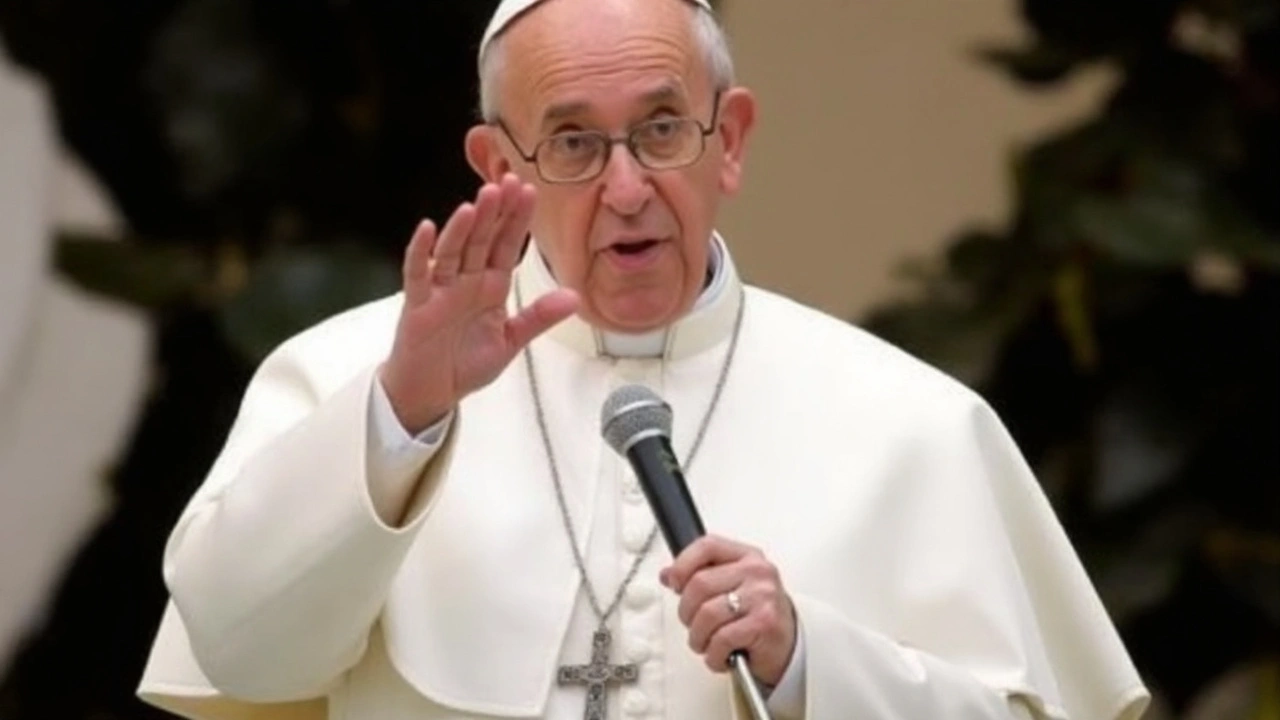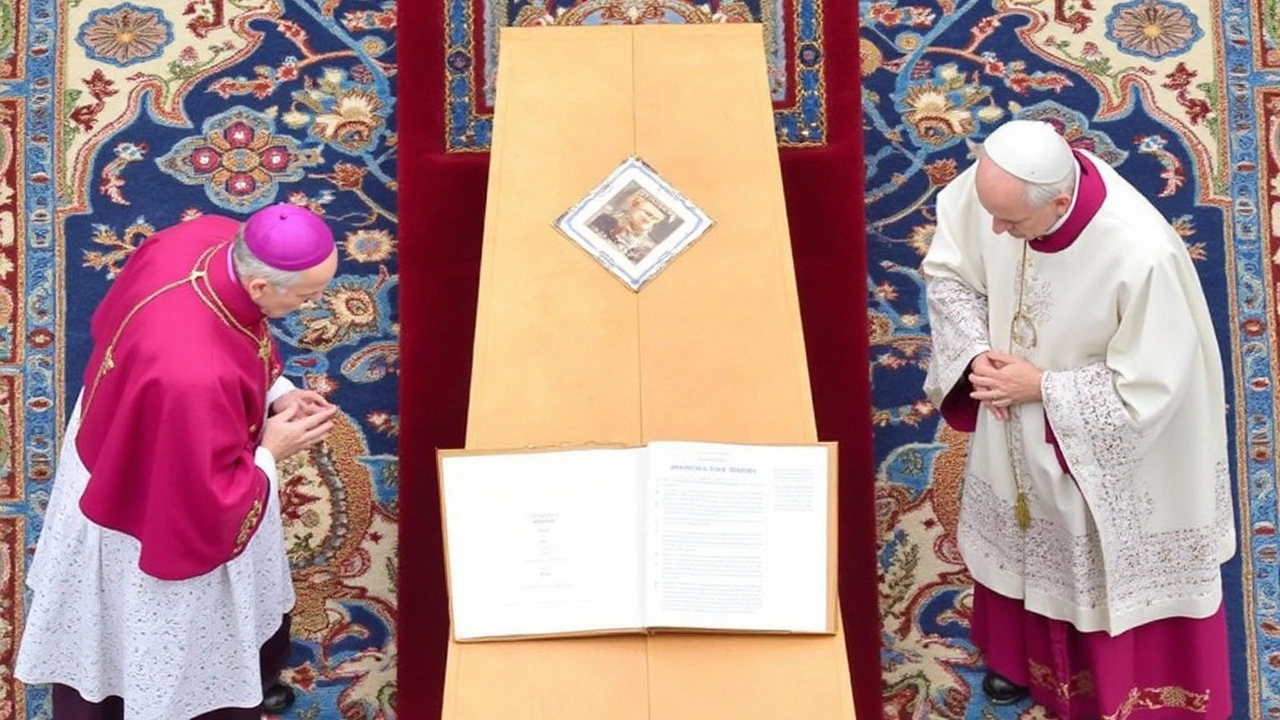
The Relatable Pope: Breaking Down Barriers
Ask almost anyone what stood out about Pope Francis, and you’re bound to hear about his warmth and direct way of speaking. When he stepped onto the world stage, he didn’t sound like the popes before him. Whether addressing millions in St. Peter’s Square or chatting with reporters on a plane, he relied on simple, relatable language. His signature phrase in 2013—“Who am I to judge?”—echoed not just through the Church halls but every corner of modern society. For many, it signaled a huge shift: a spiritual leader finally sounding like a regular person, not an untouchable authority.
Francis’s rise in 2013 came during a turbulent time for the Catholic Church. Scandals, divisions, and criticism followed years of tradition that sometimes felt out of step with ordinary people. Francis made it clear from day one that he was after something different. He greeted crowds with a casual “Brothers and sisters, good evening!” and didn’t shy away from cracking a joke—even when talking about the secretive conclave that had elected him. The world hadn’t heard a pope speak this way. Suddenly, thousands—many of whom had drifted from Church life—tuned in again, just to see what he’d say next.

‘Who Am I to Judge?’: A Phrase That Echoed Worldwide
What truly set Francis apart was his openness to topics others tiptoed around. When a reporter onboard the papal plane asked about LGBTQ+ Catholics, he dropped a bombshell: “Who am I to judge?” Four words, but they shattered decades of Church rhetoric. That wasn’t just off-the-cuff. Francis consistently showed empathy for people who felt pushed to the margins—divorced Catholics, women, immigrants, and those struggling on society’s fringes. He peppered speeches and interviews with made-up words, everyday metaphors, and offhand quips, sometimes frustrating translators but making headlines across the globe.
His style wasn’t just about being casual. For Francis, this conversational approach was a strategy. He knew the Church was seen as cold and distant. By talking like a neighbor instead of a monarch, he tried to melt centuries-old barriers. He often joked, poked fun at himself, and used gentle humor to tackle heavy topics. During highly formal moments—even announcements from the Vatican balcony—he slipped in familiar phrases or greetings, putting listeners at ease. The message was clear: faith should be approachable, not intimidating.
Even within the Vatican, some were unsure about the impact of this style. Traditionalists bristled at invented words and conversational tones, fearing it would dilute doctrine. Yet, his way opened doors to dialogue, getting people to listen who’d long given up on the Church. Whether or not everyone agreed with him, they couldn’t deny this pope had changed how leaders may reach out in the age of the instant soundbite.
Comments (8)
-
Pradeep Chabdal April 21, 2025
The papal shift you describe is reminiscent of a renaissance in ecclesiastical rhetoric, where the pontiff deliberately abandons the archaic solemnity of previous pontificates in favor of a more accessible discourse. By employing colloquialisms, Francis subtly repositions the Vatican within the vernacular sphere, thereby inviting the laity to engage with doctrine without the usual barrier of excessive formality. This calculated informality, while seemingly casual, is, in fact, a sophisticated strategy to recalibrate the Church's cultural capital in the modern era.
-
Abirami Nagarajan May 6, 2025
The pope’s simple greetings really help people feel welcome, especially those who might feel distant from the Church.
-
shefali pace May 21, 2025
It’s truly heart‑warming to see a leader of such historic weight choose words that sound like they’re spoken over a kitchen table. The phrase “Who am I to judge?” echoes the empathy we all crave, especially in a world that often feels judgmental and cold. Every time he smiles or cracks a joke, it feels like a gentle invitation for us to step closer to faith without fear. His openness to marginalized voices lifts countless souls who have felt unseen. Even the skeptics can’t deny that his humor breaks down centuries‑old walls.
By speaking in everyday language, he reminds us that spirituality isn’t confined to grand cathedrals but lives in our daily conversations.
-
sachin p June 4, 2025
From a cultural perspective, Pope Francis’ approach mirrors the broader Indian tradition of “jugaad” – finding creative, flexible solutions to entrenched problems. His informal style serves as a bridge, connecting the Vatican’s ancient heritage with the lived experiences of diverse global communities. It’s fascinating how a simple phrase can resonate across continents, reflecting a shared humanity.
-
sarthak malik June 19, 2025
Exactly, the simplicity in his greetings does more than just make people feel comfortable; it actually lowers the psychological barrier that many feel when approaching the Church. By using everyday language, he turns abstract doctrine into something tangible.
-
Nasrin Saning July 3, 2025
That’s a great point we should also remember that inclusivity isn’t just about words but about actions too it encourages others to speak up and feel heard
-
gaganpreet singh July 18, 2025
What we are witnessing is not merely a superficial adjustment of speech patterns but a profound, almost tectonic shift in the very epistemological foundations upon which the Catholic hierarchy has long rested, for centuries the papal voice resonated with an almost immutable authority that seemed to exist beyond the reach of ordinary human discourse, yet Pope Francis, in his deliberate choice to employ colloquialisms, thereby democratizes the sacred narrative, rendering it accessible to the masses; this act, in itself, is a radical redefinition of ecclesiastical power, because language is the conduit through which authority is both exercised and perceived, and by subverting the traditional linguistic hierarchy, he challenges the entrenched notion that the divine must be cloaked in the esoteric, indeed, his famed utterance “Who am I to judge?” is not a mere off‑hand remark but a manifesto that simultaneously affirms the inherent dignity of every individual while simultaneously exposing the ossified moralism that has plagued the institution for far too long, the reverberations of this shift cascade through every layer of Catholic praxis, from liturgy to pastoral care, compelling clergy worldwide to reconsider their homilies, compelling laypeople to re‑engage with doctrine in a manner that feels personally relevant, and in doing so, he catalyzes a form of spiritual renewal that is as much about communal empathy as it is about doctrinal fidelity, this nuanced balance is what makes his approach both daring and necessary, for without such a transformation, the Church would remain adrift in a sea of alienation, unable to speak the language of the very souls it vows to shepherd.
-
Urmil Pathak August 1, 2025
His words truly make the Church feel more human.
